-
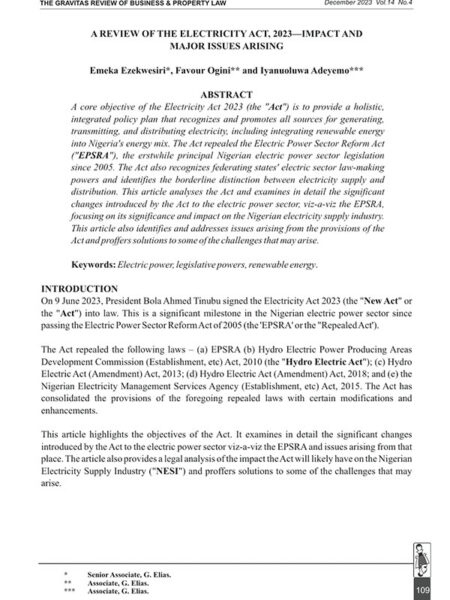
A Review of the Electricity Act, 2023 – Impact and Major Issues Arising
0₦2,500.00Emeka Ezekwesiri, Favour Ogini, and Iyanuoluwa Adeyemo, undertake a review of the Electricity Act 2023, its objectives, content and potential impact on the power regulatory landscape in Nigeria, in their article, A Review of the Electricity Act, 2023 – Impact and Major Issues Arising. The Act provides a holistic integrated policy plan that recognizes and promotes all sources for the generation, transmission, and distribution of electricity, including the integration of renewable energy into Nigeria’s energy mix. The Act repealed the Electric Power Sector Reform Act (the “EPSRA”), the erstwhile principal legislation of the Nigerian electric power sector since 2005. The Act also recognizes the electric sector law making powers of federating states and identifies the border line distinction between electricity supply and distribution. Ezekwesiri et al provide an analysis of the Act and examines in detail the major changes introduced by the Act to the electric power sector viz-a-viz the EPSRA with particular focus on its significance and impact in the Nigerian Electricity Supply Industry.
-
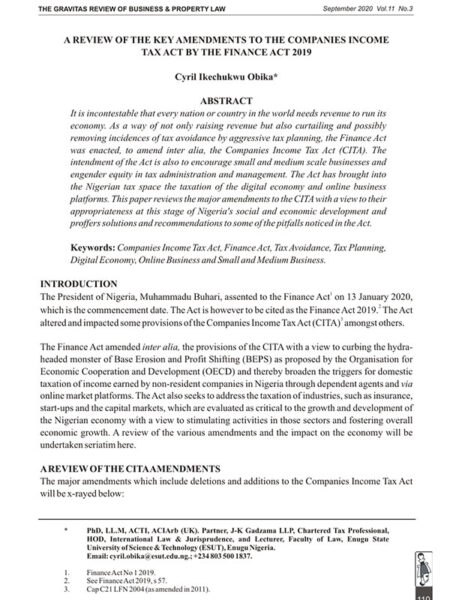
A Review of the Key Amendments to the Companies Income Tax Act by The Finance Act 2019
0₦2,500.00Dr Cyril Obika, Partner J-K Gadzama LLP and Lecturer, Faculty of Law, Enugu State University of Science and Technology (ESUT) Agbani Nigeria, in his article, A Review of the Key Amendments to the Companies Income Tax Act by The Finance Act 2019 examines significant changes to the CITA by the Finance Act including the taxation of the digital economy and online business platforms, formal introduction of the Thin Capitalisation Rule, the removal of total tax exemption on interest, and changes to the Excess Dividend Tax Rule.
-
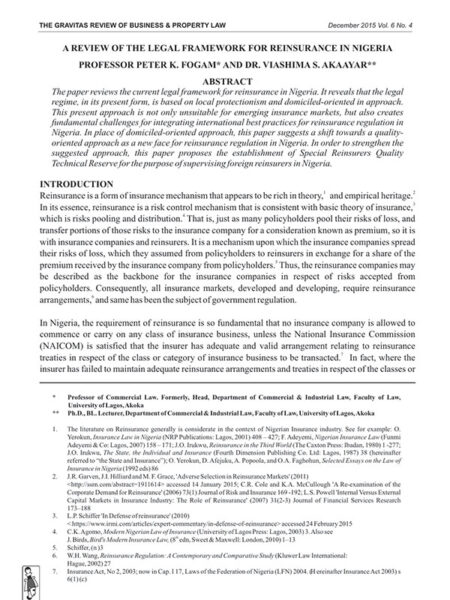
A Review of the Legal Framework for Reinsurance in Nigeria
0₦2,500.00Professor Peter Fogam and Dr. Viashima Akaayar of the Department of Commercial & Industrial Law, University of Lagos in their article, “A Review of the Legal Framework for Reinsurance in Nigeria” examines the 3 main international regulatory approaches to reinsurance. They undertake a comprehensive review of the legal regime regulating reinsurance, arguing that the Nigerian Reinsurance subsector is neither stable nor strong enough to warrant the Domiciled Oriented Regulation (DOR) apparent in several sections of the Insurance Act and other extant laws on reinsurance.
-
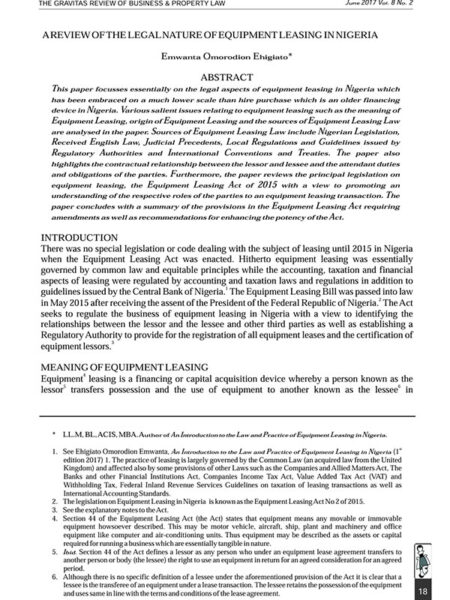
A Review of the Legal Nature of Equipment Leasing in Nigeria
0₦2,500.00Emwanta Ehigiato, author of An Introduction to the Law and Practice of Equipment Leasing in Nigeria in his article, “A Review of the Legal Nature of Equipment Leasing in Nigeria”, explores the legal aspects of equipment leasing which has been embraced on a much lower scale than hire purchase which is an older financing device in Nigeria. He analyses the legal framework for equipment leasing, the structure of an Equipment Lease Contract and obligations of parties. The paper undertakes a comprehensive review and commentary on the provision of the principal legislation on equipment leasing in Nigeria, Equipment Leasing Act of 2015.
-
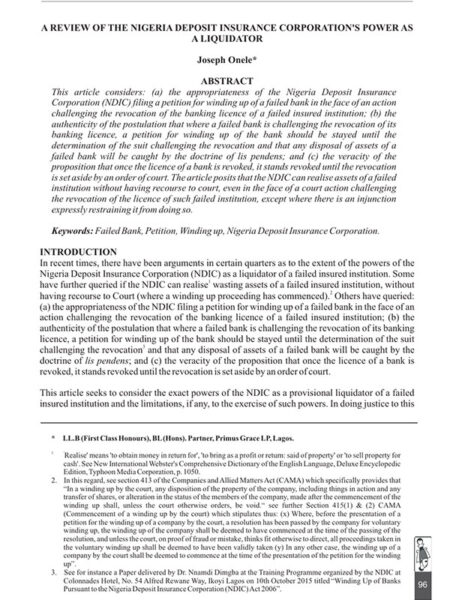
A Review of the Nigeria Deposit Insurance Corporation’s Power as a Liquidator
0₦2,500.00Joseph Onele Partner, Primus Grace LP, in his article, A Review of the Nigeria Deposit Insurance Corporation’s Power as a Liquidator considers the appropriateness of the Nigeria Deposit Insurance Corporation filing a petition for winding up of a failed bank in the face of an action challenging the revocation of the banking licence of a failed insured institution; the authenticity of the postulation that where a failed bank is challenging the revocation of its banking licence, a petition for winding up of the bank should be stayed until the determination of the suit challenging the revocation and the veracity of the proposition that once the licence of a bank is revoked, it stands revoked until the revocation is set aside by an order of court.
-
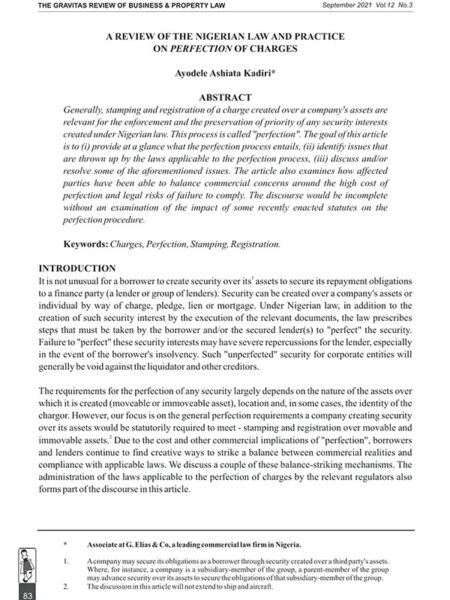
A Review of the Nigerian Law and Practice on Perfection of Charges
0₦2,500.00Ashiata Kadiri, Associate at G. Elias & Co, in her article, A Review of the Nigerian Law and Practice on Perfection of Charges, comprehensively considers the process of perfection of charges in Nigeria. She identifies the extant laws applicable to perfection noting the requirements by the Corporate Affairs Commission, the Federal Inland Revenue Service and the National Collateral Registry established under the Secured Transactions in Movable Assets Act 2017.
-
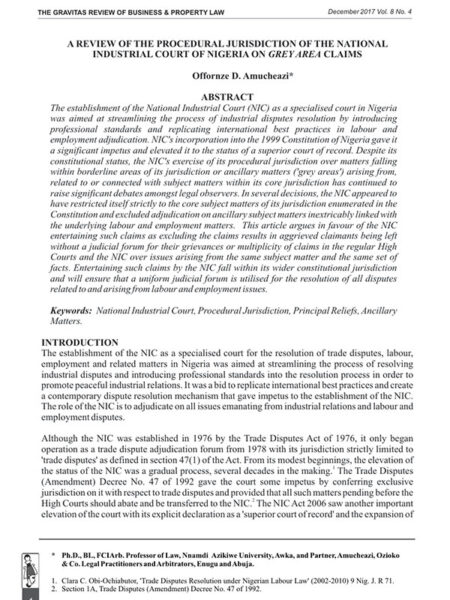
A Review of the Procedural Jurisdiction of the National Industrial Court of Nigeria on Grey Area Claims
0₦2,500.00Professor Offornze Amucheazi of Nnamdi Azikiwe University, Awka, and Partner, Amucheazi, Ozioko & Co, in his article, “A Review of the Procedural Jurisdiction of the National Industrial Court of Nigeria on Grey Area Claims”, examines the National Industrial Court’s exercise of jurisdiction over ancillary matters ‘arising from, related to or connected with’ subject matters within its core jurisdiction. He argues that despite being empowered in that regard, the NIC, from a review of several cases, appears to have restricted itself strictly to the core subject matters of its jurisdiction enumerated in the Constitution, and excluded adjudication on ancillary subject matters inextricably linked with the underlying labour and employment matters. He concludes that this cautious approach may leave aggrieved claimants without a judicial forum for their grievances, or lead to multiplicity of claims in different courts over issues arising from the same subject matter and the same set of facts.
-
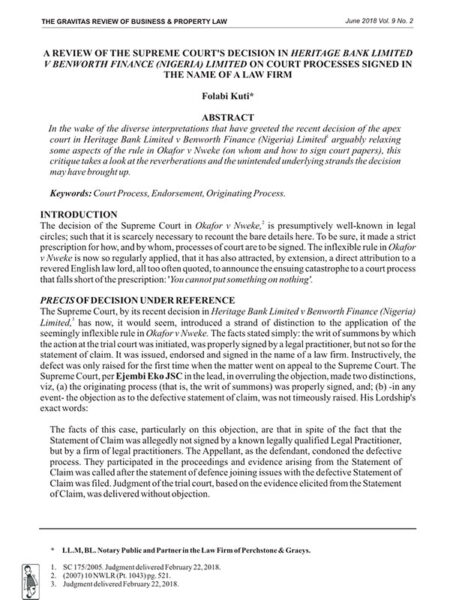
A Review of the Supreme Court’s Decision in Heritage Bank Limited v Benworth Finance (Nig) Ltd on Court Processes Signed in the Name of a Law Firm
0₦2,500.00Folabi Kuti, Partner Perchstone & Graeys, in A Review of The Supreme Court’s Decision in Heritage Bank Limited v Benworth Finance (Nigeria) Limited On Court Processes Signed in the Name of a Law Firm, contemplates the diverse interpretations that have greeted the recent decision of the apex court in the cited case arguably relaxing some aspects of the rule in Okafor v Nweke. Folabi takes a critical look at the reverberations and the unintended underlying strands the decision may have brought up.
-
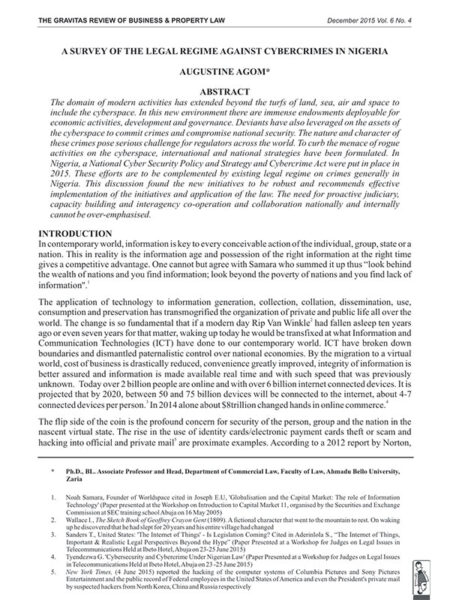
A Survey of the Legal Regime against Cybercrimes in Nigeria
0₦2,500.00Augustine Agom, Associate Professor of Law and Head, Department of Commercial Law, Ahmadu Bello University, Zaria in “A Survey of the Legal Regime against Cybercrimes in Nigeria” analyses the nature and character of cybercrimes and the provision of various laws having bearing on cybercrimes including the Cybercrimes (Prohibition, Prevention Etc.) Act 2015.
-
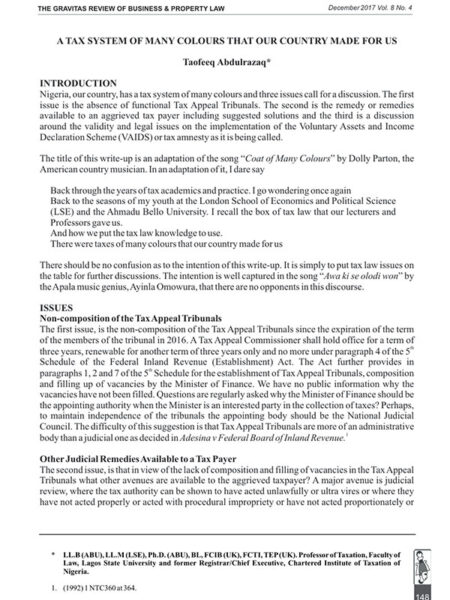
A Tax System of Many Colours that Our Country has Made for Us
0₦2,500.00Professor Taofeeq Abdulrazaq, Tax Partner, Nolands Nigeria Professional Services, waxes lyrical in “A Tax System of Many Colours that Our Country Made for Us”. He examines the legal status and validity of the Voluntary Assets and Income Declaration Scheme (VAIDS) and extra-statutory concessions, generally. He explores other judicial remedies available to a tax payer in light of the non-composition of the Tax Appeal Tribunals, and concludes that “conclusions are meaningless in a state of flux”.
-
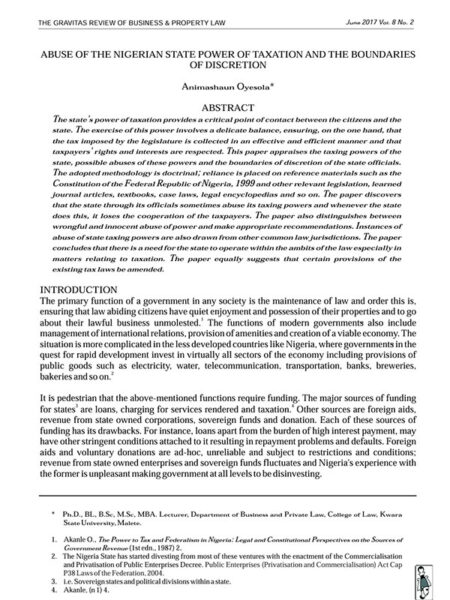
Abuse of the Nigerian State Powers of Taxation and the Boundaries of Discretion
0₦2,500.00Dr Animashaun Oyesola, of the Department of Business & Private Law, Kwara State University, Malete in his article, “Abuse of the Nigerian State Power of Taxation and the Boundaries of Discretion”, appraises the taxing powers of the Nigerian State giving examples of how the powers have been abused and distinguishing between wrongful and innocent abuse. He examines several instances of how state officials have misused their discretion and recommends how taxing statutes may be strengthened without violating the rights of the tax payer.
-
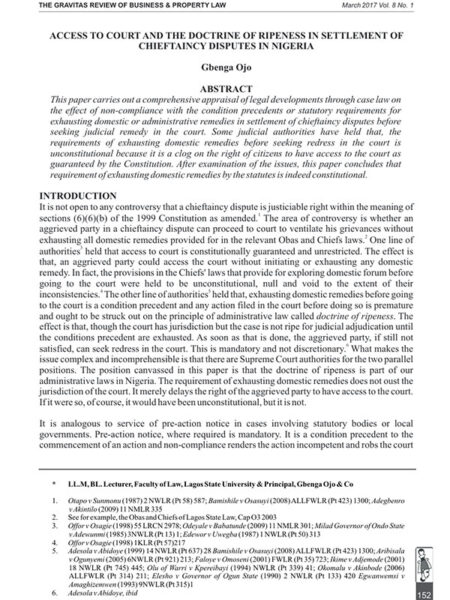
Access to Court and the Doctrine of Ripeness in Settlement of Chieftaincy Disputes in Nigeria
0₦2,500.00Gbenga Ojo, Lecturer, Lagos State University and Principal, Gbenga Ojo & Co in his article “Access to Court and the Doctrine of Ripeness in Settlement of Chieftaincy Disputes in Nigeria” undertakes a comprehensive appraisal, through case law, of the effect of non-compliance with the conditions precedent or statutory requirements for exhausting administrative remedies in settlement of chieftaincy disputes before seeking judicial remedy.
The Gravitas Review of Business & Property Law



